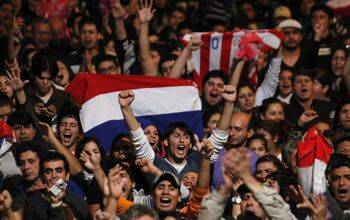As neighboring countries recalled their ambassadors from Paraguay for consultation, Fernando Lugo, the bishop-turned-president who was impeached June 22, announced that he was forming a parallel government. Paraguay's Senate ousted Lugo, 61, after a two-day trial that the former president called a "parliamentary coup d'etat." The move came after a confrontation between landless peasants and police left 17 people dead. Vice President Federico Franco, who was sworn in as president immediately, said the Senate vote was constitutional, but he faced turbulent fallout as Brazil, Chile, Argentina, Peru, Ecuador, Venezuela and Bolivia announced that they would not recognize the new government or were recalling their ambassadors for consultation. The Argentine Foreign Ministry said Franco would not be invited to attend a meeting of the Mercosur South American trading bloc scheduled for June 27 in Argentina. Ecuadorian President Rafael Correa said Paraguay's new chief executive would not be welcome at the next meeting of the Union of South American Nations. As the impeachment trial loomed, the Paraguayan bishops' conference issued a statement June 21 calling for "political prudence" and calm consideration of "the legal, political and social consequences of the impeachment trial." The bishops urged "political leaders, grassroots organizations, unions and the public to remain calm and avoid confrontation and violence." Paraguayan media reported that Bishop Claudio Gimenez Medina of Caacupe, president of the bishops' conference, met with Lugo June 21 and urged him to resign to avoid further violence and to take care of his health. Lugo has been undergoing cancer treatment for several years. Lugo took office in 2008, breaking the Colorado Party's 60-year grip on power, and his term was due to end in 2013. While in office, he faced significant political opposition from other politicians, including Franco. He also acknowledged having fathered two children while he was a bishop.
Paraguay Presidential Crisis Continues
Show Comments (
)
Comments are automatically closed two weeks after an article's initial publication. See our comments policy for more.
The latest from america
After an early morning attack on the Holy Family Church in Gaza, Pope Leo XIV called for an immediate ceasefire, dialogue and peace in the region.
Something essential is lost when generations remain siloed at church.
You’ve got a 401K. But do you have a spiritual retirement plan?
A brief opening to shore up progress toward stability in Syria unfortunately coincides with Trump administration decisions to sharply curtail humanitarian and development assistance and to terminate the U.S. Agency for International Development.








